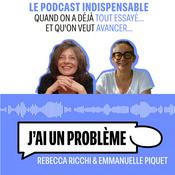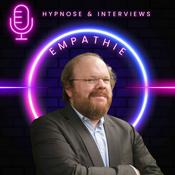767 épisodes
- Enamory is a clinical practice, training institute, and nonprofit research organization focused on psychedelic assisted couples therapy. In this episode, clinical psychologists Chandra Kian and Kayla Knopp discuss their work integrating ketamine assisted psychotherapy with evidence based couples therapy models.
Both guests trained as academic researchers at the University of California San Diego Veterans Affairs system, where they worked on large scale couples based PTSD trials. They later co founded Enamory to continue clinical work, train therapists, and conduct research focused specifically on relationships.
Early Themes in Enamory and Couples Therapy
The conversation begins with Dr. Kian and Dr. Knopp describing their background in couples based PTSD research and how that work shaped their clinical approach.
They explain how existing couples therapy models often stall when partners cannot soften, access vulnerability, or understand each other's internal experience. Their early exposure to MDMA assisted therapy research highlighted how psychedelic states can temporarily reduce defensiveness and rigid narratives. PT 647 - Joshua White: Fireside Project and Lucy, an AI Training Simulator for Psychedelic Support
22/1/2026 | 1 h 11 minFireside Project is a nonprofit that helps reduce the risks of psychedelic experiences through a free support line, coaching, education, and research. In this episode, Joshua White speaks with Psychedelics Today about why real-time support matters, what it takes to run a national hotline, and what Fireside learned after more than 30,000 conversations since launch.
White shares how his background as a lawyer and his early hotline volunteering shaped Fireside's model. He also describes how festival harm reduction work, including lessons from Zendo-style support spaces, revealed a major gap: people often need help during an experience and after it ends.
A major focus of the conversation is Lucy, Fireside's new voice-to-voice role-play simulator designed to improve psychedelic support skills through low-stakes practice.
Early Themes With Fireside Project
Joshua White introduces Fireside Project as an accessible safety net for people who are actively having psychedelic experiences or processing past ones. The support line launched on April 14, 2021, and relies on trained community volunteers who commit to a year of service.
White explains why anonymity matters. He argues that a phone-based container can make it easier for callers to share vulnerable material without fear of judgment. He also frames service as a key part of integration for volunteers who want to give back or prepare for work in the psychedelic field.
Core Insights From Fireside Project
White describes the early difficulty of building Fireside from scratch, including legal design, insurance hurdles, training development, and fundraising. He credits seed support from David Bronner and Dr. Bronner's for helping Fireside prove that people would actually use a psychedelic support line.
He also explains a key harm reduction point: calling emergency services during a non-medical psychedelic crisis can escalate risk. Fireside aims to help people regulate, re-orient, and stay safer when panic or fear shows up.
Key concepts discussed include:
The thin line between healing and traumatizing during high-intensity psychedelic states
Why callers often need connection, not rescue
How volunteer capacity and call volume shape how long conversations run
The difference between support during an experience and longer-term coaching support
Later Discussion and Takeaways With Fireside Project
The conversation then turns to Lucy, a training tool White describes as a "flight simulator" for psychedelic practitioners. Lucy is not part of the live support line. Instead, it offers emotionally responsive role-play scenarios so trainees can practice staying grounded, tracking consent and boundaries, and responding to crisis cues.
White also addresses recording and consent. He argues Fireside needs strong training feedback loops to improve safety and quality. He describes an anonymization approach designed to remove phone numbers, strip identifying details, and distort voices while preserving emotional tone. He also explains the post-call option for callers to delete their recorded conversation.
Practical takeaways include:
Simulation can help trainees stay regulated when intense material emerges
Better training can reduce unnecessary diversion to emergency rooms
Clear consent language and easy deletion workflows matter for trust
Coaching can expand the continuum of psychedelic support beyond therapy- Manvir Singh joins Psychedelics Today to unpack what shamanism means and why the term matters now. Singh is an anthropologist and author of Shamanism: The Timeless Religion. He argues that shamanism is not limited to "remote" societies or the past. Instead, it reliably reappears because it helps humans manage uncertainty, illness, and the unknown.
This episode is relevant for the psychedelic community because "shaman" often gets used loosely, or avoided entirely. Singh offers a clear framework for talking about shamanic practice without leaning on romantic myths, drug-centered assumptions, or rigid definitions that do not fit the cross-cultural record.
Early Themes With Manvir Singh
Early in the conversation, Manvir Singh explains why many classic definitions of shamanism break down when tested across cultures, including in Siberia where the term originated. He discusses how popular images of shamanism often center "soul flight" and fixed cosmologies. However, ethnography shows more variation, including possession, spirit proximity, and different ways practitioners describe altered experience.
Singh also traces his path into anthropology, including long-term fieldwork with the Mentawai people off the west coast of Sumatra. There, he studied ritual specialists known as kerei and saw how central they are to healing, ceremony, and community life.
Core Insights From Manvir Singh
At the center of the episode, Manvir Singh offers a practical three-part definition. He emphasizes these shared traits as the "beating heart" of shamanism across many settings:
A non-ordinary state (trance, ecstasy, or another altered mode)
Engagement with unseen beings or realities (spirits, gods, ancestors, witches, ghosts)
Services such as healing and divination
Singh also explores taboo, restriction, and "otherness." He explains how shamans often cultivate social and psychological distance through initiations, deprivation, and visible markers. This helps communities experience the practitioner as different in kind, which increases credibility when the practitioner claims access to hidden forces.
Later Discussion and Takeaways With Manvir Singh
Later, Manvir Singh challenges common psychedelic narratives that treat psychedelics as the universal engine of religion or shamanism. He notes that many shamanic traditions do not rely on psychedelics at all, and that rhythmic music, drumming, dance, and social ritual can reliably produce trance states.
He also clarifies a key mismatch in many contemporary "ayahuasca tourism" settings: in many traditional contexts, the specialist takes the substance to work on behalf of the patient, rather than turning the participant into the primary visionary practitioner.
Practical takeaways for the psychedelic field include:
Use definitions that fit cross-cultural evidence, not marketing language.
Avoid assuming psychedelics are required for mystical experience.
Notice how authority gets built through ritual, training, and otherness, not only through pharmacology. PT 645 - Oli Genn-Bash: Functional Mushrooms, Hype Cycles, and Mycelial Thinking
28/12/2025 | 1 h 14 minOli Genn-Bash (Brighton, UK) joins Joe Moore for a grounded conversation on the boom in functional mushrooms and why the category may be moving too quickly. As the founder of The Fungi Consultant, Oli works with consumers and brands to demystify functional mushrooms, with a focus on education, traceability, and realistic expectations.
The conversation begins with a critique of wellness hype cycles. Oli explains how consumer desperation for help with anxiety, sleep, stress, and cognition can create an opening for a rapid wave of products that are not always grounded in careful sourcing or clear science. Using lion's mane as a case study, he contrasts popular cognitive claims with traditional use, arguing that the most useful path forward is to slow down, get more literate about mechanisms, and build a market that can sustain trust over time.
Systems and Culture
Oli describes how individual health is inseparable from community realities, including food access, class dynamics, and what wellness advice can sound like when it lands from a place of privilege. They discuss mycelial thinking as a practical framework for collaboration and resource-sharing, and why mushrooms tend to attract unusually generous "teach everyone" communities.
They also explore the role of mushrooms in meaning-making and consciousness. Oli shares personal reflections on mushrooms as allies, the felt sense of "agency" in psychedelic experiences, and how those experiences can encourage behavioral change without forcing it. The conversation touches on alcohol culture in the UK and the possibility of non-alcoholic alternatives, including how functional mushrooms, microdosing, and other botanicals can support social confidence and energy for some people.
Finally, they look ahead at fungal innovation beyond supplements: materials, soil health, regenerative approaches, bioremediation, and what the broader psychedelic movement might learn from fungi's patience, symbiosis, and balance.
Key themes and takeaways
1) Why functional mushrooms feel "too fast" right now
Oli argues that functional mushrooms have accelerated into a high-pressure wellness marketplace, with brands rushing products to market and consumers struggling to determine what is legitimate, traceable, and effective. He draws parallels to the UK CBD market, describing how oversaturation and inconsistent quality can erode trust and collapse prices.
2) Lion's mane, tradition, and mechanism
Lion's mane is a useful example of how modern marketing can outrun nuance. Oli notes the gap between popular cognitive claims and traditional use, and points toward the gut-brain axis as one plausible bridge that requires more careful explanation and patience.
3) "Functional mushrooms" as a frame
Oli prefers the term functional mushrooms over medicinal mushrooms, emphasizing systems-level support rather than a pharmaceutical model. He describes a view of health that starts on the cellular level and asks what supports function, resilience, and prevention.
4) Health is individual and collective
Oli speaks candidly about barriers to wellness in the UK, including food poverty, access to education about cooking, and how class dynamics shape what health messaging sounds like. The broader point is structural: it is difficult to talk about supplements without considering the baseline conditions of daily life.
5) Mycelial thinking, futures work, and collaboration
The conversation highlights "mycelial thinking" as more than a metaphor. Oli describes collaborations in futures-oriented communities and how fungal logic can inform collaboration, non-zero-sum outcomes, and resource sharing.
6) Mushroom culture and the instinct to share
Joe notes how strikingly generous mushroom communities can be, especially around cultivation and identification. Oli agrees and adds a provocative angle: the possibility of "agency" in fungi and a sense that mushrooms invite humans into relationship, curiosity, and participation.
7) Alcohol culture and alternatives
Oli reflects on nearly three years without alcohol and describes how functional mushrooms and other botanicals can support mood, energy, and social confidence for some people. They also discuss the realities of events culture, including the need for more inclusive non-alcoholic options and sensitivity to addiction histories.
8) The next 10 years of fungi
They look at the expansion of fungi into materials, fashion, regenerative agriculture, soil health, and bioremediation. Oli emphasizes balance: fungal innovations are promising, but scaling and real-world constraints matter.
9) What the psychedelic movement can learn from fungi
Oli critiques extractive, capital-driven dynamics in the psychedelic ecosystem and suggests fungi offer a different ethic: patience, humility, symbiosis, and realism about parasitism and imbalance.PT 644 - Tricia Eastman: Seeding Consciousness, Ancestral Wisdom, and Psychedelic Initiation
22/12/2025 | 1 h 13 minIn this live episode, Tricia Eastman joins to discuss Seeding Consciousness: Plant Medicine, Ancestral Wisdom, Psychedelic Initiation. She explains why many Indigenous initiatory systems begin with consultation and careful assessment of the person, often using divination and lineage-based diagnostic methods before anyone enters ceremony. Eastman contrasts that with modern frameworks that can move fast, rely on short trainings, or treat the medicine as a stand-alone intervention.
Early Themes: Ritual, Preparation, and the Loss of Container
Eastman describes her background, including ancestral roots in Mexico and her later work at Crossroads Ibogaine in Mexico, where she supported early ibogaine work with veterans. She frames her broader work as cultural bridging that seeks respect rather than fetishization, and assimilation into modern context rather than appropriation.
Early discussion focuses on:
Why initiatory traditions emphasize purification, preparation, and long timelines
Why consultation matters before any high-intensity medicine work
How decades of training shaped traditional initiation roles
Why people can get harmed when they treat medicine as plug and play
Core Insights: Alchemy, Shadow, and Doing the Work
A major throughline is Eastman's critique of the belief that a psychedelic alone will erase trauma. She argues that shadow work remains part of the human condition, and that healing is less about a one-time fix and more about building capacity for relationship with the unconscious. Using alchemical language, she describes "nigredo" as fuel for the creative process, not as something to eliminate forever.
Key insights include:
Psychedelics are tools, not saviors
You cannot outsource responsibility to a pill, a modality, or a facilitator
Progress requires practice, discipline, and honest engagement with what arises
"Healing" often shows up as obstacles encountered while trying to live and create
Later Discussion and Takeaways: Iboga, Ethics, and Biocultural Stewardship
Joe and Tricia move into a practical and ethically complex discussion about iboga supply chains, demand pressure, and the risks of amplifying interest without matching it with harm reduction and reciprocity. Eastman emphasizes medical screening, responsible messaging, and supporting Indigenous-led stewardship efforts. She also warns that harm can come from both under-trained modern facilitators and irresponsible people claiming traditional legitimacy.
Concrete takeaways include:
Treat iboga and ibogaine as high-responsibility work that demands safety protocols
Avoid casual marketing that encourages risky self-administration
Support Indigenous-led biocultural stewardship and reciprocity efforts
Give lineage carriers a meaningful seat at the table in modern policy and clinical conversations
Frequently Asked Questions
Who is Tricia Eastman?
Tricia Eastman is an author, facilitator, and founder of Ancestral Heart. Her work focuses on cultural bridging, initiation frameworks, and Indigenous-led stewardship.
What is Seeding Consciousness about?
The book examines plant medicine through initiatory traditions, emphasizing consultation, ritual, preparation, and integration rather than reductionistic models.
Why does Tricia Eastman critique modern psychedelic models?
She argues that many models remove the ritual container and long-form preparation that reduce risk and support deeper integration.
Is iboga or ibogaine safe?
With the right oversite, yes. Eastman stresses that safety depends on cardiac screening, careful protocols, and experienced oversight. She warns against informal or self-guided use.
How can people support reciprocity and stewardship?
She encourages donating or supporting Indigenous-led biocultural stewardship initiatives like Ancestral Heart and aligning public messaging with harm reduction.
Closing Thoughts
This episode makes a clear case that Tricia Eastman Seeding Consciousness is not only a book about psychedelics, but a critique of how the field is developing. Eastman argues that a successful future depends on mature containers, serious safety culture, and respectful partnership with lineage carriers, especially as interest in iboga and ibogaine accelerates.
Links
https://www.ancestralheart.com
https://www.innertraditions.com/author/tricia-eastman
Transcript Joe Moore
Hello, everybody. Welcome back. Joe Moore with you again from Psychedelics Today, joined today by Tricia Eastman. Tricia, you just wrote a book called Seeding Consciousness. We're going to get into that a bunch today, but how are you today?
[00:00:16.07] - Tricia Eastman
I'm so good. It's exciting to be live. A lot of the podcasts I do are offline, and so it's like we're being witnessed and feels like just can feel the energy behind It's great.
[00:00:31.11] - Joe Moore
It's fun. It's a totally different energy than maybe this will come out in four months. This is real, and there's people all over the world watching in real-time. And we'll get some comments. So folks, if you're listening, please leave us some comments. And we'd love to chat a little bit later about those.
[00:00:49.23] - Tricia Eastman
I'm going to join the chat so that I can see... Wait, I just want to make sure I'm able to see the comments, too. Do I hit join the chat?
[00:01:01.17] - Joe Moore
Sometimes you can, sometimes you can't. I can throw comments on the screen so we can see them together.
[00:01:07.02] - Tricia Eastman
Cool.
[00:01:08.03] - Joe Moore
Yeah. So it'll be fun. Give us comments, people. Please, please, please, please. Yeah, you're all good. So Tricia, I want to chat about your book. Tell us high level about your book, and then we're going to start digging into you.
[00:01:22.10] - Tricia Eastman
So Seeding Consciousness is the title, and I know it's a long subtitled Plant Medicine, Ancestral Wisdom, Psychedelic Initiation. And I felt like it was absolutely necessary for the times that we are in right now. When I was in Gabon in 2018, in one of my many initiations, as as an initiative, the Fung lineage of Buiti, which I've been practicing in for 11 years now, I was given the instructions. I was given the integration homework to write this book. And I would say I don't see that as this divine thing, like you were given the assignment. I think I was given the assignment because it's hard as F to write a book. I mean, it really tests you on so many levels. I mean, even just thinking about putting yourself out there from a legal perspective, and then also, does it make any sense? Will anyone buy it? And on Honestly, it's not me. It's really what I was given to write, but it's based on my experience working with several thousand people over the years. And really, the essence of it is that in our society, we've taken this reductionistic approach in psychedelics, where we've really taken out the ritual.
[00:02:54.05] - Tricia Eastman
Even now with the FDA trial for MDMA for PTSD. There's even conversations with a lot of companies that are moving forward, psychedelics, through the FDA process, through that pathway, that are talking about taking the therapy out. And the reality is that in these ancient initiatic traditions, they were very long, drawn out experiences with massive purification rituals, massive amounts of different types of practice in order to prepare oneself to meet the medicine. Different plants were taken, like vomatifs and different types of purification rituals were performed. And then you would go into this profound initiatic experience because the people that were working with you that were in, we call it the Nema, who gives initiations, had decades of training and experience doing these types of initiatic experiences. So if you compare that to the modern day framework, we have people that go online and get a certificate and start serving people medicine or do it in a context where maybe there isn't even an established container or facilitator whatsoever. And so really, the idea is, how can we take the essence of this ancient wisdom wisdom, like when you look at initiation, the first step is consultation, which is really going deep into the history of the individual using different types of techniques that are Indigenous technologies, such as different forms of divination, such as cowrie shell readings.
[00:04:52.18] - Tricia Eastman
And there's different types of specific divinations that are done in different branches of And before one individual would even go into any initiation, you need to understand the person and where they're coming from. So it's really about that breakdown of all of that, and how can we integrate elements of that into a more modern framework.
[00:05:24.23] - Joe Moore
Brilliant. All right. Well, thank you for that. And let's chat about you. You've got a really interesting past, very dynamic, could even call it multicultural. And you've got a lot of experience that informed this book. So how did this stuff come forward for you?
[00:05:50.02] - Tricia Eastman
I mean, I've never been the person to seek anything. My family on my mother's side is from Mexico, from Oaxaca, Trique, Mixtec, and Michica. And we had a long lineage of practice going back to my, at least I know from my great, great grandmother, practicing a blend of mestiza, shamanism, combining centerea and Catholicism together. So it's more of like a syncratic mestiza, mestiza being mixed tradition. And so I found it really interesting because later on, when my grandfather came to the United States, he ended up joining the military. And in being in the US, he didn't really have a place. He's very devout spiritual man, but he didn't have a place to practice this blended spiritual tradition. So the mystical aspect of it went behind. And as I started reconnecting to my ancestral lineage, this came forth that I was really starting to understand the mystical aspect of my ancestry. And interestingly, at the same time, was asked to work at Crossroads Abigain in Mexico. And it's so interesting to see that Mexico has been this melting pot and has been the place where Abigain has chosen to plant its roots, so to say, and has treated thousands of veterans.
[00:07:36.28] - Tricia Eastman
I got to be part of the group of facilitators back over 10 years ago. We treated the first Navy Seals with Abogaine, and that's really spurred a major interest in Abogaine. Now it's in every headline. I also got 10 I got initiated into the Fung lineage of Buiti and have really studied the traditional knowledge. I created a nonprofit back in 2019 called Ancestral Heart, which is really focused on Indigenous-led stewardship. Really, the book helps as a culmination of the decade of real-world experience of combining My husband, Dr. Joseph Barzulia. He's a psychologist. He's also a pretty well-known published researcher in Abigain and 5MEO-DMT, but also deeply spiritual and deeply in respect for the Indigenous traditions that have carried these medicines before us. So we've really been walking this complex path of world bridging between how we establish these relationships and how we bring some of these ancient knowledge systems back into the forefront, but not in a way of fetishizing them, but in a way of deeply respecting them and what we can learn, but from our own assimilation and context versus appropriation. So really, I think the body of my work is around that cultural bridging.
[00:09:31.07] - Joe Moore
That's brilliant. And yeah, there's some really fun stuff I learned in the book so far that I want to get into later. But next question is, who is your intended audience here? Because this is an interesting book that could hit a few categories, but I'm curious to hear from you.
[00:09:49.02] - Tricia Eastman
It's so funny because when I wrote the book, I wasn't thinking, oh, what's my marketing plan? What's my pitch? Who's my intended audience? Because it was my homework, and I knew I needed to write the book, and maybe that was problematic in the sense that I had to go to publishers and have a proposal. And then I had to create a formula in hindsight. And I would say the demographic of the book mirrors the demographic of where people are in the psychedelic space, which It's skewed slightly more male, although very female. I think sex isn't necessarily important when we're thinking about the level of trauma and the level of spiritual healing and this huge deficit that we have in mental health, which is really around our disconnection from our true selves, from our heart, from our souls, from this idea of of what Indigenous knowledge systems call us the sacred. It's really more of an attitude of care and presence. I'm sure we could give it a different name so that individuals don't necessarily have any guard up because we have so much negative conditioning related to the American history of religion, which a lot of people have rejected, and some have gone back to.
[00:11:37.06] - Tricia Eastman
But I think we need to separate it outside of that. I would say the demographic is really this group of I would say anywhere from 30 to 55 male females that are really in this space where maybe they're doing some of the wellness stuff. They're starting to figure some things out, but it's just not getting them there. And when something happens in life, for example, COVID-19 would be a really great example. It knocks them off course, and they just don't have the tools to find that connection. And I would say it even spans across people that do a lot of spiritual practice and maybe are interested in what psychedelics can do in addition to those practices. Because when we look at my view on psychedelics, is they fit within a whole spectrum of wellness and self-care and any lineage of spiritual practice, whether it's yoga or Sufism or Daoist tradition. But they aren't necessarily the thing that... I think there's an over focus on the actual substance itself and putting it on a pedestal that I think is problematic in our society because it goes back to our religious context in the West is primarily exoteric, meaning that we're seeking something outside of ourselves to fulfill ourselves.
[00:13:30.29] - Tricia Eastman
And so I think that when we look at psychedelic medicines as this exoteric thing versus when we look at initiatory traditions are about inward and direct experience. And all of these spiritual practices and all of these modalities are really designed to pull you back into yourself, into having a direct relationship with yourself and direct experience. And I feel like the minute that you are able to forge that connection, which takes practice and takes discipline, then you don't need to necessarily look at all these other tools outside of yourself. It's like one of my favorite analogies is the staff on the Titanic were moving the furniture around as it was sinking, thinking that they might save the boat from sinking by moving the furniture around. I think that's how we've been with a lot of ego-driven modalities that aren't actually going into the full unconscious, which is where we need to go to have these direct experiences. Sorry for the long answer, but it is for everybody, and it's not just about psychedelics. Anyone can take something from this doing any spiritual work. But we talk a lot about the Indigenous philosophy and how that ties in alongside with spiritual practice and more of this inner way of connecting with oneself and doing the work.
[00:15:21.22] - Tricia Eastman
And I think also really not sugar coating it in the sense that the psychedelics aren't going to save us. They're not going to cure PTSD. Nothing you take will. It's you that does the work. And if you don't do the work, you're not going to have an 87 % success rate with opioid use disorder or whatever it is, 60 something % for treatment-resistant depression or whatever. It's like you have to do the work. And so we can't keep putting the power in the modality reality or the pill.
[00:16:03.18] - Joe Moore
Yeah, that makes sense. So you did an interesting thing here with this book, and it was really highlighting aspects of the alchemical process. And people don't necessarily have exposure. They hear the words alchemy. I get my shoulders go up when I hear alchemizing, like transmutation. But it's a thing. And how do we then start communicating this from Jung? I found out an interesting thing recently as an ongoing student. Carl Jung didn't necessarily have access to all that many manuscripts. There's so many alchemical manuscripts available now compared to what he had. And as a result, our understanding of alchemy has really evolved. Western alchemy, European alchemy, everybody. Perhaps Kmetic, too. I don't know. You could speak to that more. I don't keep track of what's revealed in Egypt. So it's really interesting to present that in a forward way? How has it been received so far? Or were you nervous to present this in this way?
[00:17:25.10] - Tricia Eastman
I mean, honestly, I think the most important The important thing is that in working with several thousand people over the years, people think that taking the psychedelic and the trauma is going to go away. It's always there. I mean, we We archetypically will have the shadow as long as we need the shadow to learn. And so even if we go into a journey and we transcend it, it's still there. So I would say that the The feedback has been really incredible. I mean, the people that are reading... I mean, I think because I'm weaving so many different, complex and deep concepts into one book, it might be a little harder to market. And I think the biggest bummer was that I was really trying to be respectful to my elders and not say anything in the title about Iboga and Abigain, even though I talk a lot about it in the book, and it's such a hot topic, it's really starting to take off. But the people that have read it really consider it. They really do the work. They do the practices in the book, and I'm just getting really profound feedback. So that's exciting to me because really, ultimately, alchemy...
[00:18:55.22] - Tricia Eastman
Yeah, you're right. It gets used Used a lot in marketing lingo and sitting in the depth of the tar pit. For me, when I was in Gabon, I remember times where I really had to look at things that were so dark in my family history that I didn't even realize were mine until later connected to my lineage. And the dark darkness connected to that and just feeling that and then knowing really the truth of our being is that we aren't those things. We're in this process of changing and being, and so nothing is is fixed, but there is a alchemical essence in just learning to be with it. And so not always can we just be with something. And and have it change, but there are many times that we can actually just be with those parts of ourselves and be accepting, where it's not like you have to have this intellectualized process It's just like, first you have the negrado, then you tune into the albeda, and you receive the insights, and you journal about it, and da, da, da, da, da Action, Mars aspect of it, the rubeda of the process. It's not like that at all.
[00:20:44.15] - Tricia Eastman
It's really that the wisdom that comes from it because you're essentially digesting black goo, which is metaphoric to the oil that we use to power all of society that's pulled deep out of the Earth, and it becomes gold. It becomes... And really, the way I like to think of it is like, in life, we are here to create, and we are not here to heal ourselves. So if you go to psychedelic medicine and you want to heal yourself, you're going to be in for... You're just going to be stuck and burnt out because that's not what we're here to do as human beings, and you'll never run out of things to heal. But if you You think of the negrado in alchemy as gasoline in your car. Every time you go back in, it's like refilling your gas tank. And whatever you go back in for as you're moving in the journey, it's almost like that bit of negrado is like a lump of coal that's burning in the gas tank. And that gets you to the next point to which there's another thing related to the creative process. So it's like As you're going in that process, you're going to hit these speed bumps and these obstacles in the way.
[00:22:07.29] - Tricia Eastman
And those obstacles in the way, that's the healing. So if you just get in the car in the human vehicle and you drive and you continue to pull out the shadow material and face it, you're going to keep having the steam, but not just focus on it, having that intention, having that connection to moving forward in life. And I hate to use those words because they sound so growth and expansion oriented, which life isn't always. It's evolutionary and deevolutionary. It's always in spirals. But ultimately, you're in a creative process would be the best way to orient it. So I think when we look at alchemy from that standpoint, then it's productive. Effective. Otherwise, it sounds like some brand of truffle salt or something.
[00:23:09.12] - Joe Moore
Yeah, I think it's a... If people want to dig in, amazing. It's just a way to describe processes, and it's super informative if you want to go there, but it's not necessary for folks to do the work. And I like how you framed it quite a bit. So let's see. There is one bit, Tricia, that my ears really went up on this one point about a story about Actually, let me do a tangent for you real quick, and then we're going to come back to this story. So are you familiar with the tribe, the Dogon, in Africa? Of course. Yeah. So they're a group that looks as though they were involved in Jewish and/or Egyptian traditions, and then ended up on the far side of like, what, Western Africa, far away, and had their own evolution away from Egypt and the Middle East. Fascinating. Fascinating stories, fascinating astronomy, and much more. I don't know too much about the religion. I love their masks. But this drew an analogy for me, as you were describing that the Buiti often have stories about having lineage to pre-dynastic Egyptian culture. I guess we'll call it that for now, the Kometic culture.
[00:24:44.23] - Joe Moore
I had not heard that before. Shame on me because I haven't really read any books about Buiti as a religion or organization, or anything to this point. But I found that really interesting to know that now, at least I'm aware of two groups claiming lineage to that ancient world of magic. Can you speak about that at all for us? Yeah.
[00:25:09.24] - Tricia Eastman
So first off, there really aren't any books talking about that. Some of the things I've learned from elders that I've spoke with and asked in different lineages in Masoco and in Fong Buiti, there's a few things. One, We lived in many different eras. Even if you go into ancient texts of different religions, creation stories, and biblical stories, they talk about these great floods that wiped out the planet. One of the things that Atum talks about, who is one of my Buiti fathers who passed a couple years ago, is Is the understanding that before we were in these different areas, you had Mu or Lumaria, you had Atlantis, and then you had our current timeline. And the way that consciousness was within those timelines was very different and the way the Earth was. You had a whole another continent called Atlantis that many people, even Plato, talks about a very specific location of. And what happened, I believe during that time period, Africa, at least the Saharan band of the desert was much more lush, and it was a cultural melting pot. So if you think about, for example, the Pygmy tribes, which are in Equatorial Africa, they are the ones that introduced Iboga to the Buiti.
[00:27:08.08] - Tricia Eastman
If you look at the history of ancient Egypt, what I'm told is that the Pygmies lived in Pharaonic Egypt, all the way up until Pharaonic Egypt. And there was a village. And if you look on the map in Egypt, you see a town called Bawiti, B-A-W-I-T-I. And that is the village where they lived. And I have an interesting hypothesis that the God Bess, if you look at what he's wearing, it's the exact same to a T as what the Pygmies wear. And the inspiration for which a lot of the Buiti, because they use the same symbology, because each part of the outfit, whether it's the Mocingi, which is like this animal skin, or the different feathers, they use the parrot feather as a symbology of speech and communication, all of these things are codes within the ceremony that were passed along. And so when you look at Bess, he's wearing almost the exact same outfit that the Pygmies are wearing and very similar to if you see pictures of the ceremonies of Misoko or Gonde Misoko, which I would say is one of the branches of several branches, but that are closer to the original way of Buiti of the jungle, so closer to the way the Pygmies practice.
[00:28:59.16] - Tricia Eastman
So If you look at Bess, just to back my hypothesis. So you look at Neteru. Neteru were the... They called them the gods of Egypt, and they were all giant. And many say the word nature actually means nature, but they really represented the divine qualities of nature. There's best. Look at him. And a lot of the historians said he's the God of Harmeline and children and happiness. I think he's more than the God of Harmeline, and I think that the Pygmies worked with many different plants and medicines, and really the ultimate aspect of it was freedom. If you think about liberation, like the libation, number one, that's drunkiness. Number two, liberation, you of freeing the joyous child from within, our true nature of who we are. You look at every temple in Egypt, and you look at these giant statues, and then you have this tiny little pygmy God, and there's no other gods that are like Bess. He's one of a kind. He's in his own category. You've You've got giant Hathor, you've got giant Thoth, you've got giant Osiris, Isis, and then you've got little tiny Bess. And so I think it backs this hypothesis.
[00:30:48.27] - Tricia Eastman
And my understanding from practitioners of Dogon tradition is that they also believe that their ancestors came from Egypt, and they definitely have a lot of similarity in the teachings that I've seen and been exposed to just from here. I mean, you can... There's some more modern groups, and who's to know, really, the validity of all of it. But there are some, even on YouTube, where you can see there's some more modern Dogon temples that are talking in English or English translation about the teachings, and they definitely line up with Kamehdi teachings. And so my hypothesis around that is that the Dogon are probably most likely pygmy descendants as, And the pygmy were basically run out of Bawiti because there was jealousy with the priest, because there was competition, because all of the offerings that were being made in the temple, there was a lot of power, connected to each of the temples. And there was competitiveness even amongst the different temples, lining the Nile and all of that, of who was getting the most offerings and who was getting the most visits. And so the Pygmies essentially were run out, and they migrated, some of them migrated south to Gabon and Equatorial Africa.
[00:32:43.07] - Tricia Eastman
And then If you think about the physical changes that happened during these planetary catastrophes, which we know that there had been more than one based on many historical books. So that whole area went through a desertification process, and the Equatorial rainforest remained. So it's highly likely even that Iboga, at one point, grew in that region as well.
[00:33:18.00] - Joe Moore
Have you ever seen evidence of artwork depicting Iboga there in Egypt?
[00:33:24.17] - Tricia Eastman
There are several different death temples. I'm trying to remember the name of the exact one that I went to, but on the columns, it looked like Iboga trees that were carved into the columns. And I think what's interesting about this... So Seychet is the divine scribe, the scribe of Egyptian wisdom. And she was basically, essentially the sidekick of Thoth. Thoth was who brought a lot of the ancient wisdom and people like Pythagoras and many of the ancient philosophers in Roman times went and studied in a lot of these Thoth lineage mystery schools. When you look at the the river of the Nile on the east side, east is the energy liturgy of initiation. It's always like if you go into a sweat lodge or if you see an ancient temple, usually the doorway is facing the east. West is where the sun sets, and so that's the death. And what's interesting about that is that it was on the west side in the death temple that you would see these aboga plants. But also Seixat was the one who was the main goddess depicted in the hieroglyphs, and there was other hieroglyphs. I mean, if you look at the hieroglyphs of Seixat, it looks like she has a cannabis leaf above her head, and a lot of people have hypothesized that, that it's cannabis.
[00:35:16.03] - Tricia Eastman
Of course, historians argue about that. And then she's also carrying a little vessel that looks like it has some mushrooms in it. And obviously, she has blue Lotus. Why would she be carrying around blue Lotus and mushrooms? I don't know. It sounds like some initiation.
[00:35:36.19] - Joe Moore
Yeah, I love that. Well, thanks so much for going there with me. This photo of Seixet. There's some good animations, but everybody just go look at the temple carvings picturing this goddess. It's stunning. And obviously, cannabis. I think it's hard to argue not. I've seen all these like, mushroom, quote, unquote, mushroom things everywhere. I'm like, Yeah, maybe. But this is like, Yes, that's clear.
[00:36:06.27] - Tricia Eastman
And if you look at what she's wearing, it's the exact same outfit as Bess, which is classic Basically, how the medicine woman or medicine man or what you would call shaman, the outfit that the healers would wear, the shamans or the oracles, those of the auracular arts, different forms of divination would wear. So if you really follow that and you see, Oh, what's Isis wearing? What's Hathor wearing? What's Thoth wearing? You can tell she's very specifically the healer. And it's interesting because they call her the divine scribe. So she's actually downloading, my guess is she's taking plants and downloading from the primordial.
[00:37:02.00] - Joe Moore
Well, okay. Thanks for bringing that up. That was a lovely part of your book, was your... There's a big initiation sequence, and then you got to go to this place where you could learn many things. Could you speak to that a little bit? And I hope that's an okay one to bring up.
[00:37:22.22] - Tricia Eastman
Are you talking about the time that I was in initiation and I went to the different ashrams, the different realms in, like Yogananda calls them astral schools that you go and you just download? It seemed like astral schools, but it seemed like it was a Bwiti initiation, where you were in silence for three days, and then Yeah, that one. So there were several different... I mean, I've done seven official initiations, and then I've had many other initiatic experiences. And I would say this one was incredible. Incredibly profound because what it showed me first was that all of the masters of the planet, it was showing me everyone from Kurt Cobain to Bob Marley to Einstein, all the people that had some special connection to an intelligence that was otherworldly, that they were essentially going to the same place, like they were visiting the same place, and they would go. And so the first thing I noticed was that I recognized a lot of people, and current, I'm not going I don't want to say names of people, but I recognize people that are alive today that I would say are profound thinkers that were going to these places as well.
[00:38:57.05] - Tricia Eastman
And interestingly, then I was taken into one of the classrooms, and in the classroom, this one, specifically, it showed me that you could download any knowledge instantaneously That essentially, having a connection to that school allowed you to download music or understand very complex ideas ideas of mathematics or physics or science that would take people like lifetimes to understand. So it was essentially showing this. And a lot of people might discredit that, that that might be a specific... That we as humans can do that. Well, I'm not saying that it's not that. I don't I don't want to say that it's anything. But what I can say is that I have definitely noticed the level of access that I have within my consciousness. And also what I notice with the masters of Bwiti, specifically in terms of the level of intelligence that they're accessing and that it's different. It's got a different quality to it. And so it was a really profound teaching. And one of the things, too, that I've learned is I use it to help me learn specific things. I don't know if I can give a positive testimonial, but I am learning French.
[00:40:55.00] - Tricia Eastman
And I noticed when I was in Aspen at the Abigain meeting, and I was with Mubeiboual, who speaks French, I started saying things French that I didn't even realize that I knew to say. I've had these weird moments where I'm actually using this tool And I'm also using it. I have a Gabonese harp. I don't know if you can see it up on the shelf over there. But I also went and asked for some help with downloading some assistance in the harp, then we'll see how that goes.
[00:41:38.17] - Joe Moore
Yeah. So that's brilliant. I'm thinking of other precedent for that outside of this context, and I can think of a handful. So I love that, like savant syndrome. And then there's a classic text called Ars Notoria that helps accelerate learning, allegedly. And then there's a number of other really interesting things that can help us gain these bits of wisdom and knowledge. And it does feel a little bit like the Dogon. The story I get is the receiving messages from the dog star, and therefore have all sorts of advanced information that they shouldn't we call it. Yeah. Yeah, which is fascinating. We have that worldwide. I think there's plenty of really interesting stuff here. So what I appreciated, Tricia, about how you're structuring your book, or you did structure your book, is that it it seems at the same time, a memoir, on another hand, workbook, like here are some exercises. On the other hand, like here's some things you might try in session. I really appreciated that. It was like people try to get really complicated when we talk about things like IFS. I'm like, well, you don't necessarily have to. You could. Or is this just a human thing, a human way to look at working with our parts?
[00:43:20.15] - Joe Moore
I don't know. Do you have any thoughts about the way you were approaching this parts work in your book versus how complicated some people make it feel?
[00:43:30.00] - Tricia Eastman
Yeah. I find that this is just my personal opinion, and no way to discredit Richard Schwartz's work. But parts work has existed in shamanism since forever. When we really look at even in ancient Egypt, Issus, she put Osiris act together. That was the metaphorical story of soul retrieval, which is really the spiritual journey of us reclaiming these pieces of ourselves that we've been disconnected from a society level or individually. And within the context of parts work, it's very organic and it feels other worldly. It's not like there's ever a force where I'm in the process with someone. And a lot of times I would even go into the process with people because they weren't accustomed to how to work with Iboga or game, and so they would be stuck. And then the minute I was like, you know, Iboga, in the tradition, it's really about... It's like the game Marco Polo. It's call and response. And so you're really an active participant, and you're supposed to engage with the spirits. And so the minute that things would show up, it'd be more about like, oh, what do you see? What's coming up here? Asking questions about it, being curious.
[00:45:17.07] - Tricia Eastman
If you could engage with it, sometimes there's processes where you can't really engage with things at all. So everything that I'm talking about is It was organically shown up as an active engagement process that it wasn't like we were going in. There have been some where you can guide a little bit, but you never push. It might be something like, go to your house, and it being completely unattached. And if they can't go there, then obviously the psyche doesn't want to go there, but it's really an exercise to help them to connect to their soul. And then in contrast, IFS is like, let's work on these different parts and identify these different parts of ourselves. But then let's give them fixed titles, and let's continually in a non-altered state of consciousness, not when we're meditating, not when we're actively in a state where we have the plasticity to change the pathway in the unconscious mind, but we're working in the egoic mind, and we're talking to these parts of ourselves. That could be helpful in the day-to-day struggles. Let's say you have someone who has a lot of rumination or a very active mind to have something to do with that.
[00:46:57.01] - Tricia Eastman
But that's not going to be the end-all, be-all solution to their problem. It's only moving the deck chairs around on the Titanic because you're still working in the framework where, I'm sorry, the Titanic is still sinking, and it may or may not be enough. It may or may not produce a reliable outcome that could be connected with some level of true relief and true connection within oneself. And so I think that people just... I feel like they almost get a little too... And maybe it's because we're so isolated and lonely, it's like, Oh, now I've got parts. I'm not by myself. I've got my fire I've got my firefighter, and I've got my guardian, and all these things. And I definitely think that IFS is a really great initiator into the idea of engaging with parts of ourselves and how to talk to them. But I don't think it's... And I think doing a session here and there, for some people, can be incredibly helpful, but to all of a sudden incorporate it in like a dogma is toxic. It's dangerous. And that's what we have to be really careful of.
[00:48:23.25] - Joe Moore
So thank you for that. There's a complicated discussion happening at the Aspen meeting. I think I was only sitting maybe 30 feet away from you. Sorry, I didn't say hi. But the folks from Blessings of the Forest were there, and I got a chance to chat with a number of them and learn more about nuclear protocols, biopiracy, literal piracy, and smuggling, and the works. I'm curious. This is a really complicated question, and I'm sorry for a complicated question this far in. But it's like, as we talk about this stuff publicly and give it increased profile, we are de facto giving more juice and energy to black markets to pirate. We're adding fuel to this engine that we don't necessarily want to see. Cameroon has nothing left, pretty much. From what I'm told, people from Cameroon are coming in, stealing it from Cabona, bringing it back, and then shipping it out. And there's It's like a whole worldwide market for this stuff. I witnessed it. This stuff. Yeah, right? This is real. So the people, the Buiti, and certain Gabanese farmers, are now being pirated. And international demand does not care necessarily about Nagoya compliance. United States didn't sign Nagoya protocol for this biopiracy protection, but we're not the only violator of these ethics, right?
[00:50:00.22] - Joe Moore
It's everywhere. So how do we balance thinking about talking about IBOCA publicly, given that there's no clean way to get this stuff in the United States that is probably not pirated materials? And as far as I know, there's only one, quote unquote, Nagoya compliant place. I've heard stories that I haven't shared publicly yet, that there's other groups that are compliant, too. But it's a really interesting conversation, and I'm curious of your perspectives there.
[00:50:34.04] - Tricia Eastman
I mean, this is a very long, drawn-out question, so forgive me if I give you a long, drawn-out answer.
[00:50:41.01] - Joe Moore
Go for it.
[00:50:41.26] - Tricia Eastman
It's all good. So in reality, I do believe... You know the first Ebo, Abogaine, that was done in the country was experiments on eight Black prisoners at a hospital under the MK program.
[00:51:01.16] - Joe Moore
Pre-lutz off, we were doing Abogaine tests on people.
[00:51:06.00] - Tricia Eastman
Yeah, so pre-Lutz off. I have a hypothesis, although a lot of people would already know me.
[00:51:12.07] - Joe Moore
No, I didn't know that. Thank you for sharing that with me.
[00:51:14.13] - Tricia Eastman
That's great. I'll send you some stuff on that. But the Aboga wanted to be here. The Abogaine wanted to be here. I think it's a complex question because on one side of the coin, you have the spirit of plants, which are wild and crazy sometimes. And then you have the initiatory traditions, which create a scaffolding to essentially put the lightning in a bottle, so to say, so that it's less damaging.
[00:51:51.13] - Joe Moore
It's almost like a temple structure around it.
[00:51:53.16] - Tricia Eastman
I like that. Yeah. Put a temple structure around it because it's like, yeah, you can work with new nuclear energy, but you have to wear gloves, you have to do all these different safety precautions. I would say that that's why these traditions go hand in hand with the medicine. So some people might say that the agenda of Iboga and even Abogaine might be a different agenda than the Buiti. And ultimately, whether we are Indigenous or not, the Earth belongs to everyone. It's capitalism and the patriarchy that created all these borders and all these separations between people. And in reality, we still have to acknowledge what the essence of Buiti is, which is really the cause and effect relationship that we have with everything that we do. And so some people might use the term karma. And that is if you're in Abogaine clinic and you're putting a bunch of videos out online, and that's spurring a trend on TikTok, which we already know is a big thing where people are selling illegal market, iBoga, is Is any of that your responsibility? Yes. And if I was to sit down with a kogi kagaba, which are the mamus from Colombia, or if I were to sit down with a who said, Hey, let's do a divination, and let's ask some deep questions about this.
[00:53:54.01] - Tricia Eastman
It would look at things on a bigger perspective than just like, Oh, this person is completely responsible for this. But when we're talking about a medicine that is so intense, and when I was younger, when I first met the medicine, I first was introduced in 2013 was when I first found out about Abigain and Iboga. And in 2014, I lived with someone who lived with a 14th generation Misoko, maybe it was 10th generation Misoco in Costa Rica. And then he decided to just start serving people medicine. And he left this person paralyzed, one person that he treated for the rest of his life. And Aubrey Marcus, it was his business partner for On It, and he's publicly talked about this, about the story behind this. If you go into his older podcasts and blog posts and stuff, he talks about the situation. And the reality is that this medicine requires a massive amount of responsibility. It has crazy interactions, such as grapefruit juice, for example, and all kinds of other things. And so it's not just the responsibility towards the buiti, it's also the responsibility of, does me talking about this without really talking about the safety and the risks, encourage other people.
[00:55:49.10] - Tricia Eastman
One of the big problems, back in the day, I went to my first guita conference, Global Abogaine Therapy Alliance in 2016. And And then, ISEARs was debating because there was all these people buying Abogaine online and self-detoxing and literally either dying or ending up in the hospital. And they're like, should we release protocols and just give people instructions on how to do this themselves? And I was like, no, absolutely not. We need to really look at the fact that this is an initiatory tradition, that it's been practiced for thousands of that the minimum level at which a person is administering in Gabon is 10 years of training. The way that we've made up for those mistakes, or sorry, not mistakes, lack of training is that we've used medical oversight. Most of the medical oversight that we've received has been a result of mistakes that were made in the space. The first patient that MAPS treated, they killed them because they gave them way over the amount of what milligrams per kilogram of Abigain that you should give somebody. Every single mistake that was made, which a lot of them related to loss of life, became the global Abogane Therapy Safety Guidelines.
[00:57:28.19] - Tricia Eastman
And so we've already learned from our mistakes here. And so I think it's really important that we understand that there's that aspect, which is really the blood on our hands of if we're not responsible, if we're encouraging people to do this, and we're talking about it in a casual way on Instagram. Like, yeah, microdosing. Well, did you know there was a guy prosecuted this last year, personal trainer, who killed someone And from microdosing in Colorado, the event happened in 2020, but he just got sentenced early 2025. These are examples that we need to look at as a collective that we need. So that's one side of it. And then the other side of it is the reciprocity piece. And the reciprocity piece related to that is, again, the cause and effect. Is A Abogaine clinic talking about doing Abogaine and doing video testimonials, spurring the efforts that are actively being made in Gabon to protect the cultural lineage and to protect the medicine. The reality is every Abogaine clinic is booked out for... I heard the next year, I don't know if that's fact or fiction, but someone told me for a year, because because of all the stuff with all the celebrities that are now talking about it.
[00:59:05.20] - Tricia Eastman
And then on top of that, you have all these policy, all these different advocacy groups that are talking about it. Essentially, it's not going to be seven... It's going to be, I would say, seven to 10 years before something gets through the FDA. We haven't even done a phase one safety trial for any of the Abigain that's being commercialized. And even if there's some magic that happens within the Trump administration in the next two years that changes the rules to fast track it, it's not going to cut it down probably more than a year. So then you're looking at maybe six years minimum. That whole time, all that strain is being put on Gabon. And so if you're not supporting Gabon, what's happening is it's losing a battle because the movement is gaining momentum, and Gabon cannot keep up with that momentum. It's a tiny country the size of Colorado. So my belief is that anyone who's benefiting from all the hype around Iboga and Abogayne or personally benefited with healing within themselves should be giving back, either to Ancestral Heart, to Blessings of the Forest, to any group that is doing authentic Indigenous-led biocultural stewardship work.
[01:00:45.21] - Joe Moore
Thanks for that. It's important that we get into some detail here. I wish we had more time to go further on it.
[01:00:54.17] - Tricia Eastman
I'll do a quick joke. I know. I have a lot.
[01:00:57.17] - Joe Moore
Yes. Now do Mike Tyson. Kidding. Yeah. So what did we maybe miss that you want to make sure people hear about your book, any biocultural stuff that you want to get out there? You can go for a few more minutes, too, if you have a few things you want to say.
[01:01:20.03] - Tricia Eastman
I mean, really, thank you so much for this opportunity. Thank you for caring and being so passionate about the context related to Buiti, which I think is so important. I would just say that I've been working with this medicine for... I've known about it for 13 years, and I've been working with it for 11 years, and this is my life. I've devoted my life to this work, me and my husband, both. And there isn't anything greater of a blessing that it has brought in our life, but it also is it's a very saturnian energy, so it brings chaos. It brings the deepest challenges and forces you to face things that you need to face. But also on the other side of the coin, everything that I've devoted and given back in service to this work has exponentially brought blessing in my life. So again, I see the issue with people doing these shortened processes, whether it's in an Abigain clinic where you just don't have the ritualistic sacred aspects of an initiatic context and really the rituals that really help integrate and ground the medicine. But you still have this opportunity to continue to receive the blessings.
[01:03:09.23] - Tricia Eastman
And I really feel in our current psychedelic movement, we essentially have a Bugatti. These medicines are the most finely-tuned sports car that can do every... Even more than that, more like a spaceship. We have this incredible tool, but we're driving it in first gear. We don't even really know how to operate it. It's like, well, I guess you could say flight of the Navigator, but that was a self-driving thing, and I guess, psychedelics are self-driving. But I feel that we are discounting ourselves so greatly by not looking into our past of how these medicines were used. I really think the biggest piece around that is consulting the genuine lineage carriers like Buiti elders, like Mubu Bwal, who's the head of Maganga Manan Zembe, And giving them a seat at the head of the table, really, because there's so much I know in my tradition, about what we do to bring cardiac safety. And why is it that people aren't dying as much in Gabon as they're dying in Abigan clinics.
[01:04:37.28] - Joe Moore
Shots fired. All right. I like it. Thank you. Thank you for everything you've done here today, I think harm reduction is incredibly important. Let's stop people dying out there. Let's do some harm reduction language. I actually was able to sweet talk my way into getting a really cool EKG recently, which I thought really great about. If you can speak clinician, you can go a long way sometimes.
[01:05:11.20] - Tricia Eastman
Yeah. Oh, no, go ahead. Sorry.
[01:05:15.17] - Joe Moore
No, that's all. That's all. So harm reduction is important. How do we keep people safe? How do we keep healing people? And thank you for all your hard work.
[01:05:27.22] - Tricia Eastman
Thank you. I really appreciate it. We're all figuring it out. No one's perfect. So I'm not trying to fire any shots at anybody. I'm just like, Guys, please listen. We need to get in right relationship with the medicine. And we need to include these stakeholders. And on the other side of the coin, I just want to add that there's a lot of irresponsible, claimed traditional practitioners that are running retreat centers in Mexico and Costa Rica and other places that are also causing a lot of harm, too. So the medical monitoring is definitely, if you're going to do anything, Because these people don't have the training, the worst thing you could do is not have someone going in blind that doesn't have training and not have had an EKG and all that stuff. But we've got a long way to go, and I'm excited to help support in a productive way, all coming together. And that's what me and Joseph have been devoted to.
[01:06:45.02] - Joe Moore
Brilliant. Tricia Eastman, thank you so much. Everybody should go check out your book Seeding Consciousness out now. The audiobook's lovely, too. Thank you so much for being here. And until next time.
[01:07:00.14] - Tricia Eastman
Thank you.
Plus de podcasts Forme et santé
Podcasts tendance de Forme et santé
À propos de Psychedelics Today
Psychedelics Today is the planetary leader in psychedelic education, media, and advocacy. Covering up-to-the-minute developments and diving deep into crucial topics bridging the scientific, academic, philosophical, societal, and cultural, Psychedelics Today is leading the discussion in this rapidly evolving ecosystem.
Site web du podcastÉcoutez Psychedelics Today, Folie Douce - parlons santé mentale ou d'autres podcasts du monde entier - avec l'app de radio.fr

Obtenez l’app radio.fr gratuite
- Ajout de radios et podcasts en favoris
- Diffusion via Wi-Fi ou Bluetooth
- Carplay & Android Auto compatibles
- Et encore plus de fonctionnalités
Obtenez l’app radio.fr gratuite
- Ajout de radios et podcasts en favoris
- Diffusion via Wi-Fi ou Bluetooth
- Carplay & Android Auto compatibles
- Et encore plus de fonctionnalités


Psychedelics Today
Scannez le code,
Téléchargez l’app,
Écoutez.
Téléchargez l’app,
Écoutez.


































![Podcast Soporifique [Histoires ennuyeuses pour dormir]](https://www.radio.fr/podcast-images/175/soporifique-histoires-pour-dormir.png?version=eca35a892403b81a06ecf77d5f0d5a92daf7ed4a)





